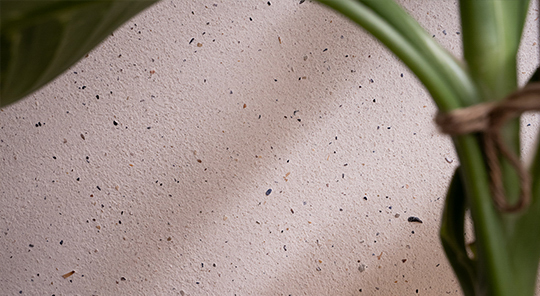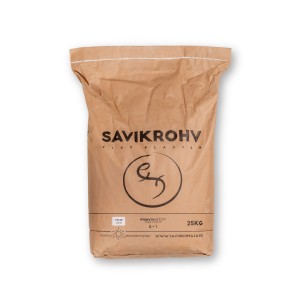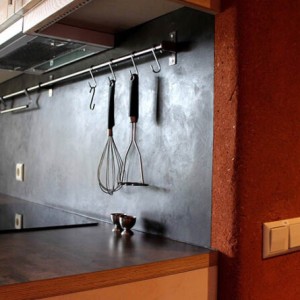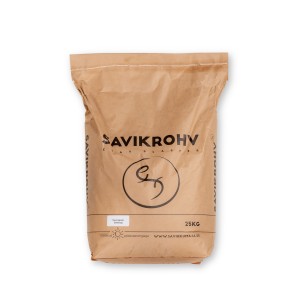Description
Savivukumaja clay plasters are the only clay plasters manufactured in Estonia and the entire nearby region that have been tested on the basis of the German standard for clay plasters ( DIN 18947:2013 08 ). Based on the standard, plasters belong to the class of
superior resistance S II. Our fine finish clay plasters include clays of different colors and sands that have been carefully selected using a special gradation curve that gives them great workability and surface strength. Fine clay plaster (granule size 0 1 mm, dry mix).
DEKO series
Natural additives: straw, woody flax straw, seashells, cornflowers, colored marble
Colors White, beige, red, caramel, orange, yellow, mustard, blue, gray, lilac, green, black, snow white. Over 30 different colors.
Use
Used for finishing clay, lime and other mineral plasters in the interior. Also suitable for plastering plasterboard, plasterboard
and natural fiber boards.
Property
Clay plaster regulates the humidity of the air in the rooms, accumulates heat, inhibits the formation of mold, neutralizes electromagnetic pollution, suppresses echoes and is suitable for people suffering from allergies. Clay plaster Savivukumaja is 100% natural and reusable. It is possible to model round edges and different shapes. Savivukumaja clay plaster has a high adhesion and resistance to the surface. No pigments were used in the fine finish plasters, instead clays of various colors were used.
Substrate
We recommend the application of Savivukumaja primer on the surfaces of bases plastered with clay. This helps prevent the color of our fine finish plaster from mixing with the base coat, increases adhesion and prevents the finish mix from drying too quickly. Uncoated surfaces must be moistened before plastering. We recommend using Savivukumaja fine finish lime plasters on smooth surfaces with poor adhesion (concrete, plasterboard, etc.) to improve adhesion beforehand.
Conditions
The temperature of the base surface and the ambient air must be above 5°C. Small color differences may occur between different batches of the same product due to the small variation of natural raw materials. Tools Floats, bucket, trowels (rectangular modeling trowels, finishing trowels, Swiss trowels), plaster spray.
Mixing
Add 5-6 liters (25kg bag) or 7-8 liters (20kg bag, for bluefin tuna only) of clean water to a dry mix bag, mix well. The best way is to prepare the mixture a day before plastering. The mixture should be left for at least half an hour. The plaster must be mixed again after it has stood.
Installation I
Structural finish
Apply a layer/layers of 2-3 mm. Level the surface with a long Swiss trowel or palette knife. Allow the plaster to solidify and level the surface with a rubber float using circular motions.
Installation ll
Smooth finish
Apply a layer/layers of 2-3 mm. Level the surface with a long Swiss trowel or palette knife. Allow the plaster to solidify and level the surface with a damp sponge using circular motions. Before the surface is completely dry, gently smooth it again with a damp sponge to remove any loose grain from the surface.
Installation III
(DEKO)
Apply a layer/layers of 2-3 mm. Level the surface with a long Swiss trowel or palette knife. Allow the plaster to solidify and level the surface with a damp sponge using circular motions. Before the surface is completely dry, gently smooth it again with a damp sponge to remove any loose grain from the surface. Once the surface is completely dry, smooth it with a relatively dry sponge to highlight the effect of the decorative additives.
Finishing
For the final finish, the surface must be primed internally with UKU cellulose primer. This binds the clay particles together better and the surface remains strong. Before priming, wipe loose sand from the surface with a brush or sponge. Decorative plaster clay can be painted with UKU clay paint.
Maintenance
Potential surface damage can be repaired. We recommend storing finishing materials from the same lot for this purpose. The plaster can be cleaned with a dry method (no water/chemicals/wet sponge) or covered again with the same finishing material. Clay plaster is antistatic and does not collect dust. Clay plaster absorbs oils and liquids.
Consumption
3.5-5 kg/1 m²
PACKAGING 2MM COVERAGE 3MM COVERAGE
25 kg bag approximately 7 m² approximately 5 m²
Safety
Avoid inhaling the dust and protect your eyes from it. Wash with a saline solution in case of direct contact with the eyes.
Preservation
Store in dry conditions.











Reviews
There are no reviews yet.